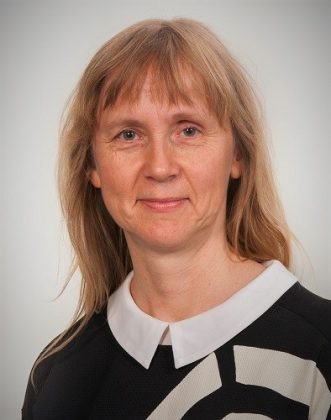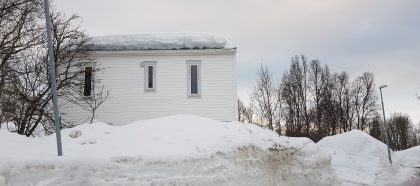Libraries and sustainability: Mariann Løkse, UiT, The Arctic University of Norway
This is the second blog in a series in which we ask libraries around the world about their sustainability policies and experiences. This is a subject of significant relevance here at Cambridge University Press, as we work towards our own sustainability targets. Read the previous post from Australian National University here.
Introduction
UiT, the Arctic University of the Norway, is a medium-sized, multi-campus research university of international renown. One of its areas of priority is to “help promote economic, cultural and social development in the north through building knowledge and human capital”. In order to achieve this, its stated first aim is to be at the international forefront in energy, climate, society and the environment. As the University is keenly aware, understanding what happens in the Arctic (the “High North”) is key to understanding global climate change.
UiT’s mission is therefore to develop cutting-edge knowledge on:
- The causes and effects of changes in climate and the environment
- Conventional and renewable energy production
- The necessary social, economic and legal adaptations to changes in climate and environment
- Exploring opportunities and the associated challenges for indigenous people that climate change brings.
More about UiT and its strategic plan can be found online.
The challenges of supporting sustainability initiatives at UiT
With its main campus located at 69˚N, the University has its own challenges to face when trying to promote sustainability. There is no railway in the region and the winters are long. Frequent travel by air is unavoidable. Travelling to Oslo by car entails a twenty-four-hour drive!
The University Library is not a single entity but a very scattered resource comprised of eleven separate libraries situated in five towns. The northernmost of these is more than 400 km by car from Tromsø, while the furthest south is 230 km away

As Mariann Løkse, the Head of Library Services at UiT, observes: “It’s fair to say we struggle with keeping travel on a low scale. An environmentally-friendly railway service would be on top of our wish list, but it seems a long time coming!”
However, UiT more than offsets its carbon footprint by the extensive range of research it supports on environmental and sustainability issues. Its academics work on developing practical solutions, often collaborating with other institutions based in different countries in the far North, including Canada, the USA, Greenland, Finland, Sweden and Russia. Projects founded or collaborated on by academics at UiT are currently addressing a number of key environmental issues, including technological solutions that promote broad and inclusive social development and a diverse business development in the north; technology that solves challenges related to health, the external environment and safety; and digital competence in education.
As a concrete example of this, UiT is now testing out an electrical aircraft at its School of Aviation. These are small planes which will be powered by a solar cell system at the airport. Two planes have recently been purchased by the University to be used for research on environmentally-friendly air travel.
To better involve students in questions of the environment, UiT has employed 5 students part-time as sustainability pilots to promote at the University the United Nations’ sustainable development goals in teaching and research.
The Library supports all these initiatives through the deployment of its resources. It has itself been at the forefront of some environmentally-friendly initiatives.
How does the Library take a leading role in supporting sustainability?
Mariann says that UiT University Library was one of the first in Norway to have a policy which promotes and prefers digital resources over print resources. “Initially, we focused on e-journals, but from 2011 our acquisition policy has stipulated we should order e-books instead of printed books when possible.”
Because of the geographical distance between the various UiT campuses, the Library decided to create an information literacy MOOC, to make sure students would get support wherever they were based. The MOOC was created on an open platform and is free for anyone to use.
(IKOMP) The Library has also created a range of online courses to reduce the need for students and researchers to travel to the campus in Tromsø: e.g., courses in research data management, reference tools and open access publishing. (Some examples may be found here.
The UiT Resource Centre for Teaching, Learning and Technology (RESULT), which is part of the Library, contributes greatly to research on digital learning and offers support to teachers who want to increase their skills in online teaching and the use of digital learning tools and methods. Since the corona pandemic, RESULT has been in high demand: the need for increased skills in these areas is obvious.
On a more mundane level, the Library has stopped offering plastic bags to users, while some years ago a more stringent printing policy significantly reduced the amount of free student printing allowed. The previous policy had allowed unlimited free printing to all students, which led to huge amounts of copy being left at the printer and never collected. The new arrangement gives each student a limited amount of free printing each year, thus making them more careful about what they print. (The allowance is still quite generous, giving up to 1000 pages free per student.)
The Library as curator
Curation is not a major area of operation at UiT, but it is still important. Mariann takes up the story: “We do have some special collections (maps and books) that we try to preserve from dampness, insects and other damage. Some are quite valuable and are kept in special collection rooms. There is particular focus on temperature regulation and keeping the rooms free of damaging insects, especially a silverfish that enjoys eating paper (ctenolepisma longicaudata). Our main problem is updating the physical room so that it remains a ‘safe environment’ for these documents. Of our three rooms for special collections, only one is well suited for this purpose. Our special collections are almost entirely dedicated to the North and our Arctic regions.
How can publishers and other suppliers help your environmental initiatives?

“For us, good e-resources are necessary when working on environment policies. We don’t have any particular initiatives at the moment, but we hope – and believe – that e-books will develop further, both through the creation of more interactive content and by improving readability through pioneering better e-book-readers. This is emphatically an area in which publishers can help, by encouraging and advising authors and engaging them in such activities.”
How has the Covid-19 lockdown affected the Library?
“We were completely closed until this week [the last full week of April]. Now we have opened a limited ‘take away-service’ for our users. They send their orders to us and pick up the books after we’ve had a day or two to locate them, or the book is sent by post if the user lives far away from one of the pick-up libraries. We think sending books by post is both safer (corona-wise) and more environmentally friendly than asking the student to travel to the nearest library.
“We see the present situation as an opportunity to promote our digital services and resources in a better way. We are offering digital support for literature searches and will soon open a library chat service to extend the help we can give to students, some of whom are now worrying about their exams. All exams at UiT will be conducted digitally for the rest of this semester. Postgraduate students defending their PhDs will also have to do this digitally.
“On a more general level, improving the teachers’ digital skills has become a necessary focus point, and should the present situation continue into the autumn term, there will be a pressing need to increase the amount of digital teaching courses offered to teachers.”
Obtaining open access to all research is also an important issue for UiT. It is essential to spreading innovation and research on sustainability matters. These are important issues the Library must contribute to, to ensure continuing high quality education and research at the university.






